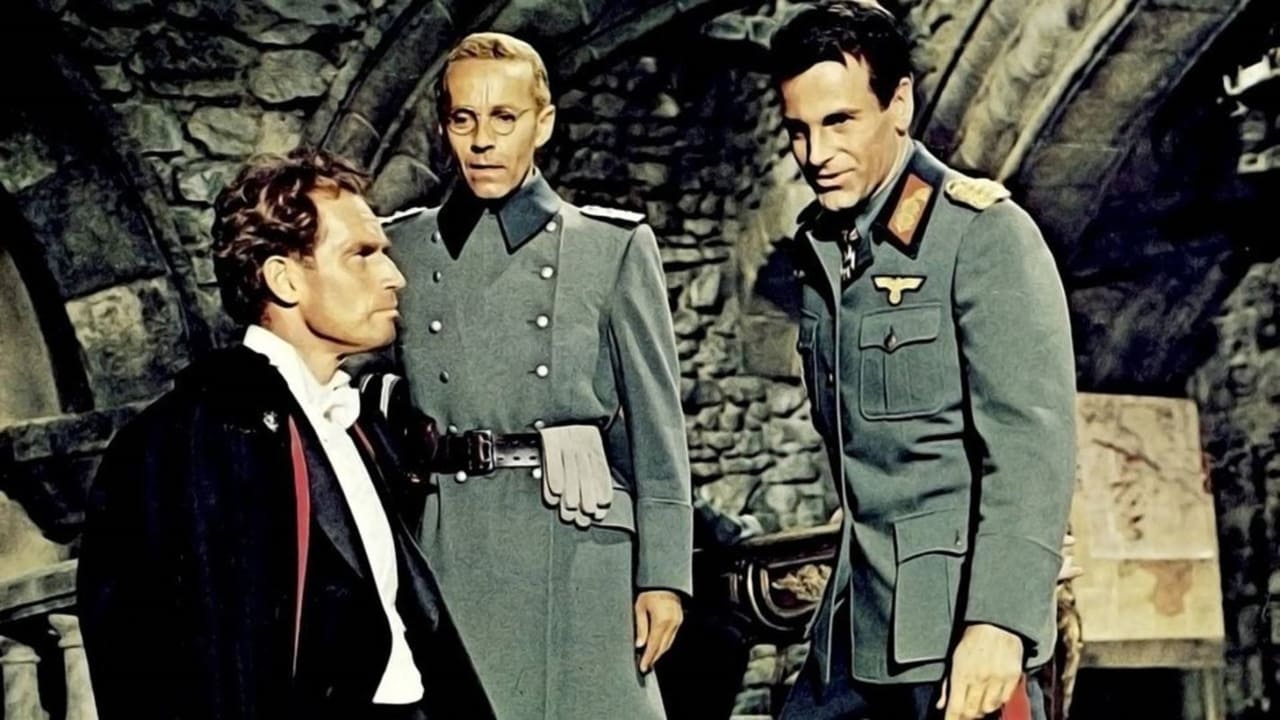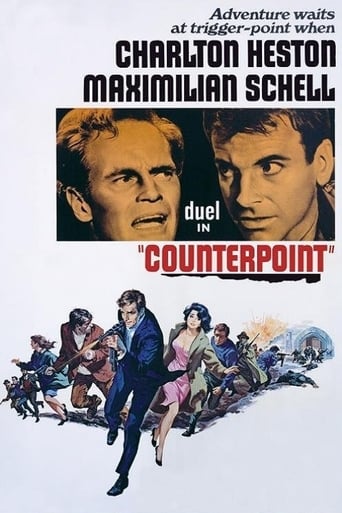Alicia
I love this movie so much
SunnyHello
Nice effects though.
Janis
One of the most extraordinary films you will see this year. Take that as you want.
Yazmin
Close shines in drama with strong language, adult themes.
Gunn
I know the plot may be a little far-fetched, but this is still a very involving and entertaining film. It takes place near the end of World War II when most of central Europe is secure and USO troupes are busy entertaining the Allied troops. A Philharmonic Orchestra on a USO tour ends up in Belgium and encounters a pocket of Nazi soldiers. Captured, the orchestra is to be exterminated after the General (Maxmillian Schell) wangles a personal concert out of the arrogant conductor (Charlton Heston). The mind games between these two, regarding the staging of a concert is part of the fun. The music is great, adding to the tension and enjoyment of the film. It holds up very well after 40 plus years. It works both as an action film and a character study. Anton Diffring stands out in a very fine cast. Topnotch! BEWARE the DVD: I ordered the DVD from a company I will not name nd it was of very poor quality. The film, which is in color, was dark and black most of the way through and the focus was not sharp. The sound was low-fi, fuzzy and unacceptable to my criteria. We need to wait for Universal to put out a decent print. Don't waste your money on this one!
davidporter224
I saw this film when it first came out and thought it was excellent, Charlton Heston's best. I don't think the plot was too far-fetched, after all, the Battle of the Bulge DID occur and a USO orchestra could have been caught behind the enemy lines like this one was. Perhaps the German general would not have been quite so brutal, front line troops were not like concentration camp guards, but Charlton Heston HAD discovered important information about the German fuel situation. I too, would like to get a copy of it on VHS or DVD. I actually do have a 16mm film copy of it, 3 reels I think, which I would gladly donate to anyone for a DVD in return!
silverscreen888
This is perhaps not a great movie; but as many viewers have attested over the years, it is a very memorable attempt at entertainment. The context of this dramatic film is WWII. People do strange things in wartime, I suggest; but once one accepts the physical presence of a fine orchestra led by a pompous but talented man in harm's way, where he can be coveted, captured and coerced by a civilized Nazi officer and menaced by an SS type, everything else falls into place. The other elements in the plot about an orchestra leader "not playing, for time" to save the lives of his orchestra's members and two US soldiers who have been caught in the same zone with no escape are these: a traitor in the orchestra; a relationship between the leader and a cellist; his relations with her husband, his concertmaster, the SS officer's desire to exterminate them, and the desire of the Nazi captor to have them play something just for him in the midst of wartime--these are unusual attributes for a 'war film, I assert. Those who missed the main point of the film, that the ethics of emergencies are different than those of normative times, thus missed why the movie was made. There are examples, in history such as "Playing For Time": for instance, of musicians and Jewish ones and females being kept alive to play for Nazi officers; the clever part here is that writers James Lee and Joel Oliansky 'fictionalized' the idea by providing interesting additions to the basic situation, which are: the aforementioned affair, the danger that brings out the characters more strongly, the need NOT to play, and the additional element of a traitor in their midst, the two US types and the often-used but effective distinction between civilized Germans serving Hitler's Nazi war'machine' and SS types enjoying their unlimited power to do harm to anyone they single out during that war. The change in the leader's character during the film is that he must remain true to himself and also prioritize what he does for the good of the group, no easy task. And the music is wonderful, the atmosphere so good even naysayers have remarked on it. As to the acting, it is far better than the mumbling and often ludicrous submediocrity that has characterized Hollywood unprofessionalism since 1973. The film was directed by Ralph Nelson. The good cast included Charlton Heston as the monomaniacal maestro, Maximilian Schell and Anton Diffrimf as the German contestants for the lives of the orchestra's members, Leslie Nielse and Kathryn hays as the other members of the love triangle, plus Neva Patterson, Cyril Delevanti, Gregory Morton, Parley Baer, Ed Peck, Peter Masterson, Curt Lowens and many more. Original music for the film was composed by Bronislau Kaper; cinematography was done by Russell Metty. Art direction was done by Carl Anderson and Alexander Golitzen, set decoration by John McCarthy Jr. and George Milo with costumes by Burton Miller The film is well-=aced, the dialogue above average, many scenes well-thought out; and the music alone is worth the price of admission. Anyone who does not enjoy this film and believe in its essential logic is perhaps an opponent of realistic behavior, actions that consist of dealing with the unusual sometimes, and with something other than rock-and-roll level cardboard types characterized by what is wrong with them and not by anything higher. Worth seeing more than once.
Ray209
The very first movie I looked up when I stumbled on the IMDB was "Counterpoint." For years I had told people about this movie and how much of an impact it had on me, but no one had ever seen it -- some tried to convince me that I had imagined the whole thing! In their defense, it is a rather strange plot. I give this movie a substantial amount of the credit for beginning my appreciation for classical music. Unfortunately, you can only see it by purchasing it (I would presume). If the idea of a WWII/classical music/POW/intensely-driven-conductor movie sounds stupid, it probably isn't worth the price. If it sounds like it's right up your alley -- you shouldn't be disappointed.

